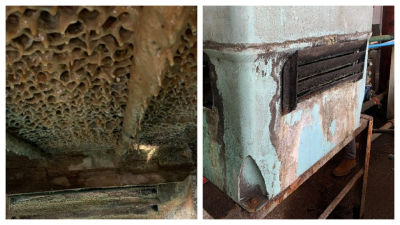West Bromwich firm fined following outbreak of Legionnaires’ disease

A plastics manufacturing company in West Bromwich has been fined after it put workers and the public at risk of being infected with potentially deadly bacteria.
The Health and Safety Executive (HSE) investigated Riaar Plastics Limited after members of the public became infected with Legionnaire’s disease in September 2020.
Five people were infected with the potentially deadly lung infection. One person was taken to intensive care and put on a ventilator after being infected.
Riaar Plastics Limited was fined for failing to manage the risk of Legionella.
HSE found the water-cooling towers inherited by Riaar Plastics Limited at its site on Black Lake, West Bromwich, were in an extremely poor condition.
This allowed Legionella bacteria to grow in the water-cooling towers and pipes, exposing employees and members of the public to risks of significant ill health.
Riaar Plastics Limited, of Black Lake, West Bromwich, West Midlands, pleaded guilty to breaching Section 2(1) and 3(1) of the Health and Safety at Work Act 1974.
The company was fined £50,000 and ordered to pay £11,000 in costs at Birmingham Magistrates’ Court on 2 June 2023.
HSE principal inspector Jenny Skeldon said: “The condition of the cooling towers at this site was the worst I had ever seen. The Legionella exposure risk to employees, site visitors, neighbouring duty holders and members of the public was extreme in nature.
“Exposure to Legionella can cause death or serious illness where water cooling systems are not been managed effectively.
"It is really important that proactive management of the risk from Legionella bacteria is taken seriously.
"There are well publicised and simple precautions for companies to take, and if followed, will ensure that employers manage and control the risk.”
Riaar Plastics Limited has been contacted for comment.
What is legionnaire's disease?
Legionellosis is a collective term for diseases caused by legionella bacteria including the most serious Legionnaires' disease.
Legionnaires' disease is a potentially fatal form of pneumonia and everyone is susceptible to infection. The risk increases with age but some people are at higher risk including:
people over 45 years of age
smokers and heavy drinkers
people suffering from chronic respiratory or kidney disease
diabetes, lung and heart disease
anyone with an impaired immune system
Where does it come from?
Legionella bacteria are widespread in natural water systems, eg rivers and ponds. However, the conditions are rarely right for people to catch the disease from these sources.
Outbreaks of the illness occur from exposure to legionella growing in purpose-built systems where water is maintained at a temperature high enough to encourage growth, eg cooling towers, evaporative condensers, hot and cold water systems and spa pools used in all sorts of premises.
How do people get it?
People contract Legionnaires' disease by inhaling small droplets of water (aerosols), suspended in the air, containing the bacteria. Certain conditions increase the risk from legionella if:
the water temperature in all or some parts of the system may be between 20-45 °C, which is suitable for growth
it is possible for breathable water droplets to be created and dispersed eg aerosol created by a cooling tower, or water outlets
water is stored and/or re-circulated
there are deposits that can support bacterial growth providing a source of nutrients for the organism eg rust, sludge, scale, organic matter and biofilms
Read more: